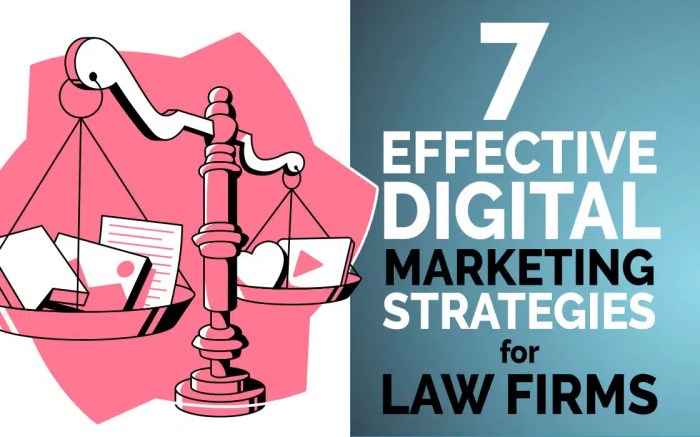Embarking on the journey of exploring the best online marketing strategies for law firms in 2025, this comprehensive guide aims to shed light on the evolving landscape of digital marketing in the legal industry.
Delving deeper into the nuances of online marketing, this guide will equip you with valuable insights and practical tips to stay ahead of the curve in the competitive legal market.
Importance of Online Marketing for Law Firms

In 2025, online marketing has become increasingly crucial for law firms to stay competitive in a digital landscape that is constantly evolving. With the majority of potential clients turning to the internet to find legal services, establishing a strong online presence is essential for law firms looking to enhance visibility and attract new clients.
Enhanced Visibility and Client Acquisition
Online marketing offers law firms the opportunity to reach a wider audience and target specific demographics more effectively than traditional marketing methods. By utilizing search engine optimization (), social media marketing, and content marketing strategies, law firms can increase their visibility online and attract potential clients who are actively seeking legal services.
- Strategies: By optimizing their website and content for relevant s and phrases, law firms can improve their search engine rankings and appear higher in search results, increasing the likelihood of being found by potential clients.
- Social Media Marketing: Law firms can leverage social media platforms to engage with their audience, share valuable content, and build relationships with potential clients. This can help enhance brand awareness and attract new clients through social referrals.
- Content Marketing: Creating informative and valuable content, such as blog posts, articles, and videos, can establish law firms as industry experts and attract clients who are seeking information and guidance on legal matters.
Shift Towards Digital Platforms
The shift towards digital platforms in 2025 has significantly impacted marketing strategies for law firms, necessitating a greater focus on online channels to connect with clients and stand out in a competitive market.
- Virtual Consultations: With the rise of virtual consultations and online communication tools, law firms can connect with clients remotely and provide services more efficiently, expanding their reach beyond geographical boundaries.
- Online Reviews and Reputation Management: Online reviews and reputation management have become critical for law firms, as potential clients often rely on feedback and testimonials from other clients to make decisions. Maintaining a positive online reputation is essential for attracting new clients and building trust.
- Data Analytics and Performance Tracking: Law firms can leverage data analytics and performance tracking tools to measure the effectiveness of their online marketing campaigns, identify areas for improvement, and make data-driven decisions to optimize their strategies for better results.
Trends in Online Marketing for Law Firms
In the ever-evolving landscape of digital marketing, law firms need to stay updated with the latest trends to effectively reach and engage their target audience online.
Social Media Platforms in the Marketing Mix for Law Firms
Social media platforms play a crucial role in the marketing mix for law firms by providing a direct channel to connect with potential clients, build brand awareness, and establish credibility. With the rise of platforms like LinkedIn, Facebook, Twitter, and Instagram, law firms can showcase their expertise, share valuable content, and engage in meaningful conversations with their audience.
Leveraging social media for targeted advertising can also help law firms reach specific demographics and increase visibility in a competitive market.
Importance of Content Marketing and Strategies for Law Firms
Content marketing and strategies are essential for law firms to improve their online visibility and attract organic traffic to their websites. By creating high-quality and informative content that addresses common legal questions and concerns, law firms can position themselves as thought leaders in their practice areas.
Implementing best practices such as optimization, link building, and mobile responsiveness can help law firms rank higher in search engine results pages, driving more traffic and leads to their websites.
Leveraging Technology for Marketing
In today's digital age, law firms can greatly benefit from leveraging innovative technologies for their marketing efforts. These technologies not only help in reaching a wider audience but also enhance client engagement and streamline various marketing processes.
Impact of AI and Automation
AI and automation have revolutionized marketing for law firms by providing efficient ways to analyze data, personalize marketing campaigns, and automate repetitive tasks. For example, AI-powered tools can analyze client behavior patterns to tailor marketing messages and predict potential leads.
Automation tools can also schedule social media posts, send personalized emails, and manage online ads, saving time and resources for law firms.
Chatbots and Virtual Assistants
Chatbots and virtual assistants play a crucial role in improving client engagement and lead generation for law firms. These AI-powered tools can interact with website visitors in real-time, answer frequently asked questions, schedule appointments, and provide personalized recommendations based on user preferences.
By offering instant support and information, chatbots and virtual assistants enhance the overall client experience and increase the chances of converting leads into clients.
Building a Strong Online Presence
Building a strong online presence is crucial for law firms to attract and retain clients in the digital age. A robust online reputation can help establish trust and credibility with potential clients, setting the firm apart from competitors. Here are some strategies to enhance your online presence:
The Importance of a Mobile-Friendly Website and Responsive Design
In today's mobile-centric world, having a mobile-friendly website with responsive design is essential for law firms. A responsive website adapts to different screen sizes and devices, providing a seamless user experience. This not only improves usability but also boosts search engine rankings, as Google prioritizes mobile-friendly websites in search results.
Utilizing Online Reviews and Testimonials
Online reviews and testimonials play a significant role in influencing the decision-making process of potential clients. Positive reviews can build credibility and trust, while negative reviews can deter prospects. Encourage satisfied clients to leave reviews on platforms like Google My Business, Yelp, or Avvo.
Responding to reviews, whether positive or negative, shows that the firm values feedback and is committed to client satisfaction.
Engaging on Social Media Platforms
Social media platforms provide an excellent opportunity for law firms to engage with their audience, share valuable content, and showcase expertise. By consistently posting relevant updates, articles, and insights, law firms can position themselves as thought leaders in their field.
Engaging with followers through comments, messages, and shares can also help build relationships and foster trust.
Creating High-Quality Content
Producing high-quality, informative content such as blog posts, articles, case studies, and videos can help establish the firm's expertise and authority in the legal industry. Content marketing not only attracts and educates potential clients but also improves search engine optimization () by driving organic traffic to the website.
Sharing valuable content demonstrates the firm's knowledge and commitment to serving clients.
Targeted Marketing Campaigns
Targeted marketing campaigns play a crucial role in the success of law firms' online marketing strategies. By focusing on specific demographics and behaviors, law firms can tailor their messages to reach the right audience at the right time, ultimately increasing their chances of converting leads into clients.
Importance of Targeted Marketing Campaigns
Targeted marketing campaigns allow law firms to reach their ideal clients more effectively by tailoring their messaging to specific demographics and behaviors. By narrowing down their target audience, law firms can create personalized and relevant content that resonates with potential clients, increasing engagement and conversion rates.
- Creating personalized content: By understanding the demographics and behaviors of their target audience, law firms can create personalized content that addresses their specific needs and pain points.
- Increasing conversion rates: Targeted marketing campaigns help law firms reach the right audience with the right message, increasing the likelihood of converting leads into clients.
- Maximizing ROI: By focusing their resources on reaching a specific audience, law firms can maximize their return on investment by targeting those most likely to become clients.
Examples of Effective Targeting Strategies
Law firms can implement various targeting strategies based on demographics and behaviors to enhance the effectiveness of their marketing campaigns. Some examples include:
- Geotargeting: Targeting ads to specific locations where the target audience is located, increasing relevance and engagement.
- Behavioral targeting: Tailoring ads based on users' online behaviors and interests, ensuring the message resonates with their preferences.
- Demographic targeting: Segmenting the audience based on characteristics such as age, gender, income, and education level to deliver more personalized content.
Role of Retargeting and Personalized Messaging
Retargeting and personalized messaging are essential components of online marketing for law firms, helping to nurture leads and guide them through the client journey. By retargeting users who have shown interest in their services and delivering personalized messages, law firms can stay top-of-mind and increase conversions.
- Retargeting: Reaching out to users who have visited the law firm's website or engaged with their content, reminding them of the services offered and encouraging them to take the next step.
- Personalized messaging: Tailoring messages based on users' interactions with the law firm's website or previous engagements, creating a more personalized and relevant experience.
Closure

In conclusion, the strategies Artikeld here serve as a roadmap for law firms looking to optimize their online presence and attract a steady stream of clients in the digital age. By embracing these cutting-edge techniques, law firms can position themselves for success in 2025 and beyond.
FAQs
What role does play in online marketing for law firms?
plays a crucial role in improving a law firm's online visibility and attracting organic traffic to their website, ultimately leading to more potential clients.
How can law firms effectively utilize social media platforms for marketing?
Law firms can leverage social media to engage with their audience, share valuable content, and establish credibility in the legal industry.
What are some innovative technologies that law firms can use for marketing purposes?
Law firms can utilize AI tools, automation software, and chatbots to streamline marketing efforts, enhance client engagement, and generate leads efficiently.


![5 Best Field Service Management Software [2025]](https://ae.goodstats.id/wp-content/uploads/2025/09/38877ff56f11b8e71045b45896b02652-350x250.jpg)








